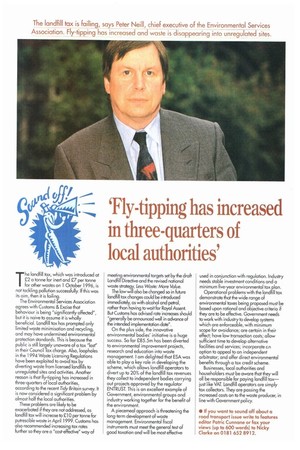The landfill tax is failing, says Peter Neill, chief executive
Page 47

If you've noticed an error in this article please click here to report it so we can fix it.
of the Environmental Services Association. Fly-tipping has increased and waste is disappearing into unregulated sites.
'Fly-tipping has increased in three-quarters of local authorities'
The landfill tax, which was introduced at 22 a tonne for inert and 27 per tonne for other wastes on 1 October 1996, is not tackling pollution successfully. If this was its aim, then it is failing.
The Environmental Services Association agrees with Customs & Excise that behaviour is being "significantly affected", but it is naive to assume it is wholly beneficial. Landfill tax has prompted only limited waste minimisation and recycling, and may have undermined environmental protection standards. This is because the public is still largely unaware of a tax "lost" in their Council Tax charge. Also, loopholes in the 1994 Waste Licensing Regulations have been exploited to avoid tax by diverting waste from licensed landfills to unregulated sites and activities. Another reason is that fly-tipping has increased in three-quarters of local authorities, according to the recent Tidy Britain survey. It is now considered a significant problem by almost half the local authorities.
These problems are likely to be exacerbated if they are not addressed, as landfill tax will increase to £10 per tonne for putrescible waste in April 1999. Customs has also recommended increasing tax rates further so they are a "cost-effective" way of meeting environmental targets set by the draft Landfill Directive and the revised national waste strategy, Less Waste: More Value.
The law will also be changed so in future landfill tax changes could be introduced immediately, as with alcohol and petrol, rather than having to wait For Royal Assent. But Customs has advised rate increases should ,`generally be announced well in advance of the intended implementation date".
On the plus side, the innovative environmental bodies' initiative is a huge success. So far 285.5m has been diverted to environmental improvement projects, research and education into waste management. I am delighted that ESA was able to play a key role in developing the scheme, which allows landfill operators to divert up to 20% of the landfill tax revenues they collect to independent bodies carrying out projects approved by the regulator ENTRUST. This is an excellent example of Government, environmental groups and industry working together for the benefit of the environment.
A piecemeal approach is threatening the long-term development of waste management. Environmental fiscal instruments must meet the general test of good taxation and will be most effective used in conjunction with regulation. Industry needs stable investment conditions and a minimum five-year environmental tax plan. Operational problems with the landfill tax demonstrate that the wide range of environmental taxes being proposed must be based upon rational and objective criteria if they are to be effective. Government needs to work with industry to develop systems which are enforceable, with minimum scope For avoidance; are certain in their effect; have low transaction costs; allow sufficient time to develop alternative facilities and services; incorporate c n option to appeal to an independent arbitrator; and offer direct environmental benefits through a tax credit scheme. Businesses, local authorities and householders must be aware that they will all be responsible for paying landfill tax— just like VAT. Landfill operators are simply tax collectors. They are passing the increased costs on to the waste producer, in line with Government policy.
• If you want to sound off about a road transport issue write to features editor Patric Cunnane or fax your views (up to 600 words) to Nicky Clarke on 0181 652 8912.








































































































